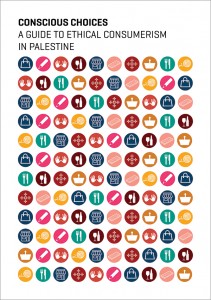By: Muna Dajani and Lina Isma’il
Heinrich-Böll-Stiftung, April 2015
144 pages, available in Arabic and English, free of charge
 During the summer of 2014, environmentalists Muna Dajani and Lina Isma’il conducted research for an innovative Palestinian guidebook, which will soon be published by the Heinrich Boell Foundation’s Ramallah office. The authors visited farmers, artisans, and companies throughout Palestine, and wrote 100 profiles introducing their work. The result of their journey is a guidebook that invites its readers to get to know the people behind the products they buy, and to build and expand their own individual network of producers.
During the summer of 2014, environmentalists Muna Dajani and Lina Isma’il conducted research for an innovative Palestinian guidebook, which will soon be published by the Heinrich Boell Foundation’s Ramallah office. The authors visited farmers, artisans, and companies throughout Palestine, and wrote 100 profiles introducing their work. The result of their journey is a guidebook that invites its readers to get to know the people behind the products they buy, and to build and expand their own individual network of producers.
Aggressive global economic policies and unchecked consumption patterns have led to resource extraction and environmental degradation that threaten to far surpass our planet’s ecological limits. Multinational companies undermine local economies and push small-scale producers to the sidelines (if not out of business altogether). In Palestine, these global phenomena are exacerbated by an ongoing belligerent occupation that not only places heavy restrictions on the movement of Palestinian people and goods but also has institutionalized a tight grip on the Palestinian economy. This is done through the terms of the Paris Protocol which de facto makes the export of Palestinian produce impossible and at the same time leads to a flood of Israeli products in Palestinian markets and stores.
Lack of access to land and markets and misguided development policies have marginalized the Palestinian agricultural sector that contributes less and less to the national GDP, while agricultural produce is largely imported from Israel. Attempts to build an export-oriented, industrialized agriculture that produces cash crops and uses chemical pesticides have badly damaged small producers, as have the PA’s attempts to turn the Palestinian economy into a service economy. Palestinian handicrafts and traditional works have all but lost their place on local market shelves, to the extent that even Palestinian symbols such as the kaffiyeh carry labels identifying them as “Made in China.”
While activists, Palestinian consumers, and the Palestinian Authority have pushed for a boycott of products and produce from the Israeli occupying power – a movement accelerated during times of increased violence such as the latest war on Gaza in 2014 – the limited availability of local products makes conscious purchase choices difficult. Aiming to shop locally and support small-scale farmers and traditional handicrafts, however, is not solely a political choice in response to the local context. Communities around the world are looking to refocus their consumption locally, choose local seasonal produce over year-round availability, support small producers and traditional handicrafts, and through this, aim to counteract the very consumption patterns that are so harmful towards their health, the environment, and social justice.
Palestine already has its very own “slow food” movement and groups such as Sharaka and Beit Al Karameh, which try to reconnect consumers with farmers. They build on consumption traditions that are not new to Palestinian society at all: direct interaction with farmers and producers, seasonal cooking, traditional and cultural rituals that mark seasonal changes, and a politically motivated “resistance economy” are all practices and concepts that have been tried and trusted before. Moreover, supporting local producers by shopping baladi products will not only strengthen the Palestinian economy and help preserve traditional production methods, it will also place Palestine among the many communities worldwide that struggle to escape overbearing economic policies and resource exploitation.
» Reviewed by Svenja Oberender, Heinrich-Böll-Stiftung,
Palestine & Jordan

